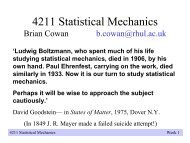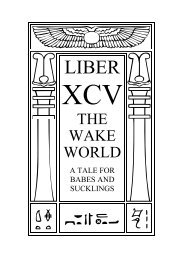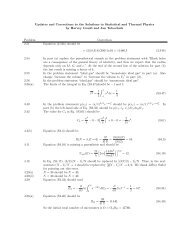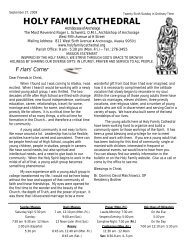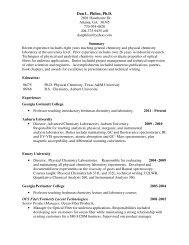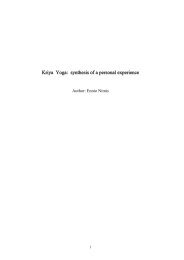Manifesto of the Communist Party - WebRing
Manifesto of the Communist Party - WebRing
Manifesto of the Communist Party - WebRing
Create successful ePaper yourself
Turn your PDF publications into a flip-book with our unique Google optimized e-Paper software.
enlightenment <strong>of</strong> <strong>the</strong> working class. The practical measures proposed in <strong>the</strong>m[59] -- such as <strong>the</strong><br />
abolition <strong>of</strong> <strong>the</strong> distinction[60] between town and country, <strong>of</strong> <strong>the</strong> family, <strong>of</strong> <strong>the</strong> carrying on <strong>of</strong><br />
industries for <strong>the</strong> account <strong>of</strong> private in dividuals, and <strong>of</strong> <strong>the</strong> wage system, <strong>the</strong> proclamation <strong>of</strong><br />
social harmony, <strong>the</strong> conversion <strong>of</strong> <strong>the</strong> functions <strong>of</strong> <strong>the</strong> State into a mere superintendence <strong>of</strong><br />
production, all <strong>the</strong>se proposals point solely to <strong>the</strong> disappearance <strong>of</strong> class antagonisms which were,<br />
at that time, only just cropping up, and which, in <strong>the</strong>se publications, are recognised in <strong>the</strong>ir earliest,<br />
indistinct and undefined forms only. These proposals, <strong>the</strong>refore, are <strong>of</strong> a purely Utopian character.<br />
The significance <strong>of</strong> Critical-Utopian Socialism and Communism bears an inverse relation to<br />
historical development. In proportion as <strong>the</strong> modern class struggle develops and takes definite<br />
shape, this fantastic standing apart from <strong>the</strong> contest, <strong>the</strong>se fantastic attacks on it, lose all practical<br />
value and all <strong>the</strong>oretical justification. Therefore, although <strong>the</strong> originators <strong>of</strong> <strong>the</strong>se systems were, in<br />
many respects, revolutionary, <strong>the</strong>ir disciples have, in every case, formed mere reactionary sects.<br />
They hold fast by <strong>the</strong> original views <strong>of</strong> <strong>the</strong>ir masters, in opposition to <strong>the</strong> progressive historical<br />
development <strong>of</strong> <strong>the</strong> proletariat. They, <strong>the</strong>refore, endeavour, and that consistently, to deaden <strong>the</strong><br />
class struggle and to reconcile <strong>the</strong> class antagonisms. They still dream <strong>of</strong> experimental realisation<br />
<strong>of</strong> <strong>the</strong>ir social Utopias, <strong>of</strong> founding isolated "phalansteres," <strong>of</strong> establishing "Home Colonies," <strong>of</strong><br />
setting up a "Little<br />
page 73<br />
Icaria"[*] -- duodecimo editions <strong>of</strong> <strong>the</strong> New Jerusalem -- and to realise all <strong>the</strong>se castles in <strong>the</strong> air,<br />
<strong>the</strong>y are compelled to appeal to <strong>the</strong> feelings and purses <strong>of</strong> <strong>the</strong> bourgeois. By degrees <strong>the</strong>y sink into<br />
<strong>the</strong> category <strong>of</strong> <strong>the</strong> reactionary conservative Socialists depicted above, differing from <strong>the</strong>se only by<br />
more systematic pedantry, and by <strong>the</strong>ir fanatical and superstitious belief in <strong>the</strong> miraculous effects<br />
<strong>of</strong> <strong>the</strong>ir social science.<br />
They, <strong>the</strong>refore, violently oppose all political action on <strong>the</strong> part <strong>of</strong> <strong>the</strong> working class; such<br />
action, according to <strong>the</strong>m, can only result from blind unbelief in <strong>the</strong> new Gospel.<br />
The Owenites in England, and <strong>the</strong> Fourierists in France, respectively oppose <strong>the</strong> Chartists and<br />
<strong>the</strong> Réformistes.[61]<br />
* Phalanstères were Socialist colonies on <strong>the</strong> plan <strong>of</strong> Charles Fourier; Icaria was <strong>the</strong> name given by<br />
Cabet to his Utopia and, later on, to his American <strong>Communist</strong> colony. [Note by Engels to <strong>the</strong> English edition <strong>of</strong><br />
1888.]<br />
"Home Colonies" were what Owen called his <strong>Communist</strong> model societies. Phalanstères was <strong>the</strong> name <strong>of</strong><br />
<strong>the</strong> public palaces planned by Fourier. Icaria was <strong>the</strong> name given to <strong>the</strong> Utopian land <strong>of</strong> fancy, whose <strong>Communist</strong><br />
institutions Cabet portrayed. [Note by Engels to <strong>the</strong> German edition <strong>of</strong> 1890.]<br />
page 74<br />
IV



